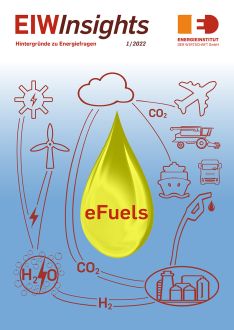eFuels are fuels and chemicals produced from water and carbon dioxide by means of renewable electricity. The focus here is on liquid fuels such as synthetic diesel, petrol, paraffin or methanol. Their use in combustion engines or processes is climate-neutral because eFuels emit only as much greenhouse gas as was removed from the atmosphere for their production.
Period: October 2022
Project Partner: eFuel alliance Österreich, Wirtschaftskammer Österreich

EIWInsights 1/2022 eFuels (German only)
The booklet addresses the following questions:
- What are eFuels, what are they needed for?
- How are eFuels produced?
- Is there enough green energy?
- How will production costs and prices develop?
- How sustainable are eFuels?
- What can eFuels be used for?
The basic building blocks for renewable eFuels are hydrogen, produced via electrolysis from green electricity, and CO2, obtained by capture from exhaust gas streams or ambient air, which are finally synthesised into eFuels.
eFuels are characterised by high volumetric energy density (energy content per litre), can be easily stored and thus solve a fundamental problem of the energy transition: making energy flexibly available.
Since eFuels can be transported over long distances with low energy losses, the global potential of solar and wind power from distant regions can be made useable.
Shipping and air traffic, as well as parts of heavy goods traffic on the roads, are segments of the transport sector that are not suitable for direct use of electricity or hydrogen according to the current state of technology. The use of eFuels also has the advantage that today's conventional drives, including the existing transport, storage and tank infrastructure, can continue to be used.
The special quality of eFuels is their drop-in capability: depending on availability, they can be mixed with conventional fuels and gradually replace them.
This booklet also contains illustrative examples of projects in Germany and abroad. For more in-depth information on the topic, there are many links to current studies, articles and lectures.
This issue was produced with the kind support of the eFuel Alliance Austria and the Austrian Federal Economic Chamber.

